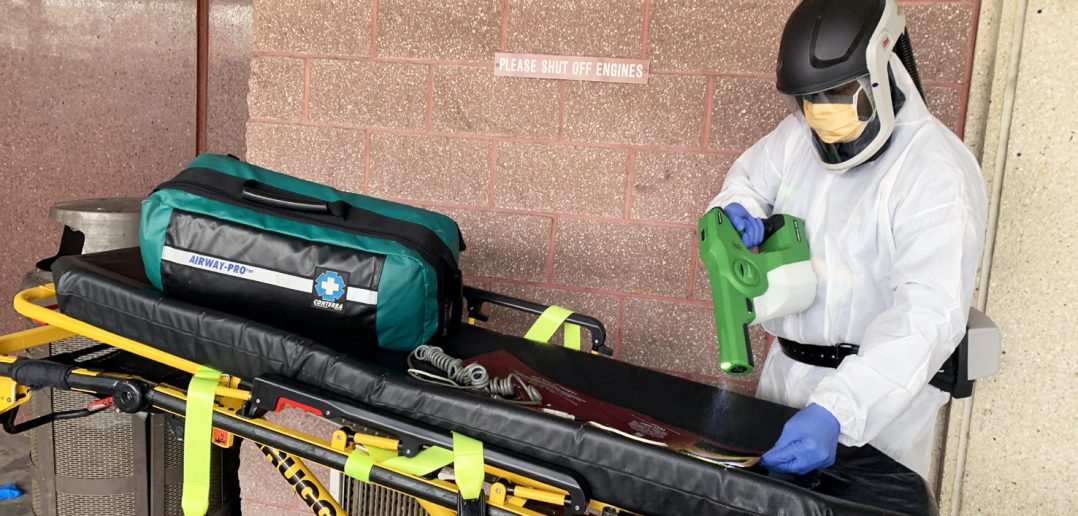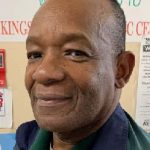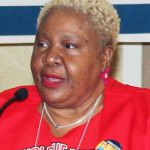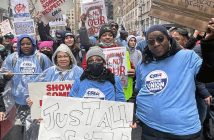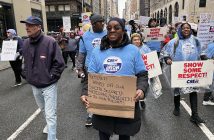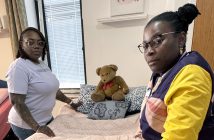As the unprecedented COVID-19 worldwide pandemic hit New York, CSEA members across the Metropolitan Region continue to perform their essential jobs despite the universal challenges.
At the New York State Veterans Home in St. Albans, Queens, visitors are no longer allowed on the premises and a CSEA-represented nurse takes the temperature of essential employees at the door.
“We’re trying to hold it together,” said Unit President Allyson Baptiste. She cautioned that the dwindling supplies of protective gear has members worried. “The most important thing right now are those masks.”
While staff currently has enough protective gloves and hand sanitizers, Baptiste is concerned that the masks staff are currently using is not sufficient or adequate since they are ill-fitting, for starters.
“Everybody is wearing a mask. Thank God no one has gotten sick,” said Baptiste. At the Veterans Home, CSEA has members work in the nursing, dietary, engineering, housekeeping departments in addition to administrative staff.
As a precaution, a unit at the home, where some 250 veterans currently reside, has been vacated with the intention of using it to quarantine residents returning from the hospital or other facilities. It’s a measure that raises some concerns for Baptiste since staff has to attend to their needs and the needs of other residents at the facility.
Experience equals expertise
If there is one state agency adept at dealing with a crisis of this magnitude, it’s the AIDS Institute at the state Department of Health. Already, workers have been reassigned to work on COVID-19 response and have been deployed statewide, according to Health Research Institute Local President Deborah Hanna, whose local includes the AIDS Institute.
“Everyone goes through a training before they do this. They learn universal precautions that are necessary and additional requirements to respond to something that is so unknown as COVID-19,” said Hanna. “What I have heard so far is that it’s tiring, but also gratifying to be a part of the response.”
Speaking just days before the governor virtually shut down the state with the exception of essential personnel, Hanna noted, “The state is working as well as everyone and overtime to respond as effectively as possible.”
“There isn’t a full road map,” said Hanna. “We don’t know how this [virus]fully works.”
Hanna, who works in a building next to the World Trade Center, witnessed the attacks and was involved demanding worker protections in its aftermath. She compared the response to 9/11.
“It’s very similar in a lot of ways,” said Hanna. ‘There are a lot of questions, a lot of chaos and a lot of learning as you go along.”
More importantly, Hanna emphasized the importance of unions during such a crisis. “It further supports the idea to me why it’s important to have a union because it gives people an additional source to ask questions and get support,” said Hanna. “I saw that after 9/11 and how our unions banded together to do things management couldn’t do.”
Concerns over equipment, safety
At Brooklyn’s Kingsboro Psychiatric Center the looming concern was access to personal protective equipment and the admission of new individuals from correctional facilities.
“We are preparing one isolation area in case there is a need, an empty ward, but staff is still concerned that they need more safety precautions and equipment,” said Kingsboro Local President Conrad Forsythe. “We have an open-door policy with the director if we have any concerns.”
In addition to the cancellation of visits to the facility, management has also ordered a full medical report of incoming individuals within 24 hours, Forsythe noted.
Notwithstanding these measures, Forsythe said he is being bombarded with calls from members pleading for personal protective equipment that management apparently is rationing in light of dwindling supplies.
“I’m keeping my head up, but I see panic in the members,” said Forsythe. “They are fearful.”
‘Be strong, diligent and safe’
At SUNY Downstate a large white tent that occupies half a city block is being used for triage and to admit patients potentially infected by COVID-19.
Not unlike Kingsboro, but with added urgency since it is a hospital, workers are clamoring for masks, gowns and other protective gear.
“Our housekeeping and dietary workers, who interact with patients daily, need this safety equipment,” said SUNY Downstate Local President Althea Green. “We also need to have the proper training on how to deal with this pandemic. It shouldn’t be just for doctors and nurses.”
While she’s been assured by management that additional safety supplies are on their way, Green fears for additional workers who may become infected. Five local members, including a relative of Green’s, are currently under home quarantine after coming into contact with confirmed cases.
As of this report, Green said there were five confirmed cases of the virus at the hospital and one reported death. The patients are not CSEA members.
Nursing a fever over the weekend, but otherwise not exhibiting any classic symptoms of COVID-19, Green said,
“Everybody is still functioning at the same level and doing their routine work., but people are afraid. The housekeepers are definitely afraid.”
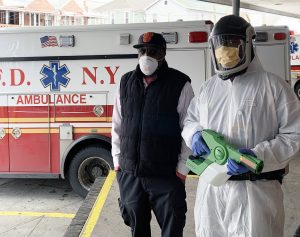
Left, CSEA SUNY Downstate Local Vice President Maurice Dunaway and Anthony Burke, in white suit, who both work at the hospital’s Housekeeping Department, are among the workers whose role of disinfecting the hospital during this pandemic is vital in protecting workers and the community.
Two CSEA members who work in the housekeeping department at SUNY Downstate shared a few words on how they’re coping with the pandemic.
“It’s a very good feeling knowing that you can help our patients,” said Anthony Burke, a SUNY Downstate housekeeping department employee. “Our main focus is safety, ours and our patients. Nothing is as important as making sure everything is clean and safe so that our patients feel comfortable and they can get better as soon as possible.”
Burke wears a white surgical suit, plastic gloves and a special helmet with a large plastic visor. He also carries an instrument that resembles a large water gun, but it sprays disinfectant.
“We’ve always practiced safety and sanitary practices,” said Burke. “But this situation goes beyond sanitizing. It’s overwhelming with so many (COVID-19) cases and seeing how the community is affected.”
Maurice Dunaway, a longtime CSEA activist and veteran of other epidemics, said the vibe at the hospital was different this time.
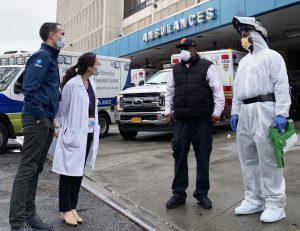
CSEA SUNY Downstate Local Vice President Maurice Dunaway, second from right, and Anthony Burke, in white suit at far right, who both work at the hospital’s Housekeeping Department, discuss how the facility is being disinfected around the clock with two doctors, left.
“It’s been very stressful with all the suspected or confirmed COVID-19 cases,” said Dunaway, a supervisor in the housekeeping department and vice president of our union’s SUNY Downstate Local. “We need to treat every case as if it’s positive.”
Dunaway said there were six confirmed COVID-19 cases at the hospital in mid-March. As this edition was going to press, he said there was close to 40 cases.
His advice to other essential and frontline workers throughout the state, “Be strong, be diligent and be safe. It’s hard, but this is what we do.”
Keeping safe
At group homes run by the Brooklyn Developmental Center, several individuals have tested positive for the coronavirus and our Brooklyn Developmental Center Local officers had asked staff not to float to the center’s houses until further notice.
“Sometimes, we have to institute these practices to save our members and the individuals,” said Brooklyn Developmental Center Local President Faye Wilkie Fields.
Brooklyn Developmental Center runs 22 houses and staff periodically floats to different homes whenever there is a need.
“We closed the dayhab completely due to the virus because we didn’t want the individuals to come into the program since we’ve had these confirmed and suspected cases,” said Wilkie Fields. “We’re also trying to get safety equipment and supplies to these three houses and we have asked for a deep cleaning of those houses.”
Staff at those houses continue to work and go home, despite confirmed cases at their sites.
“They have to wear gowns and masks in the homes daily,” said Wilkie Fields, who had just received two gallons of hand sanitizer from the state to distribute among the houses. “We are all essential workers.”
— David Galarza

